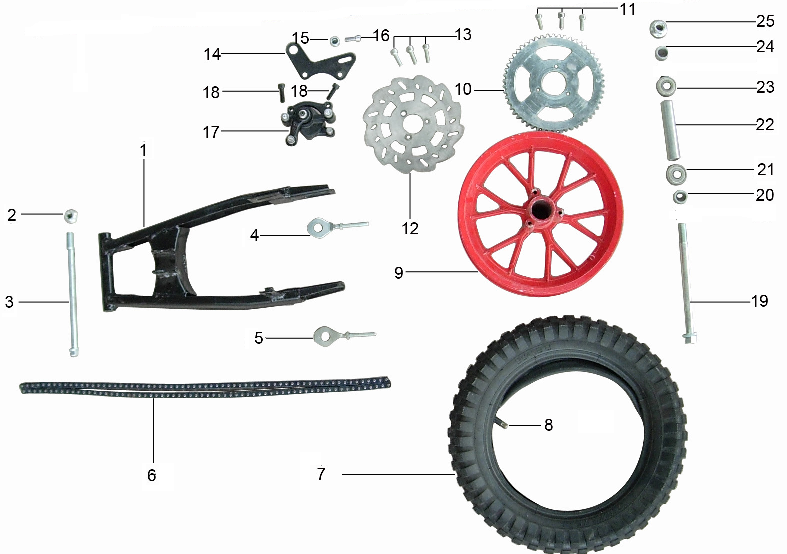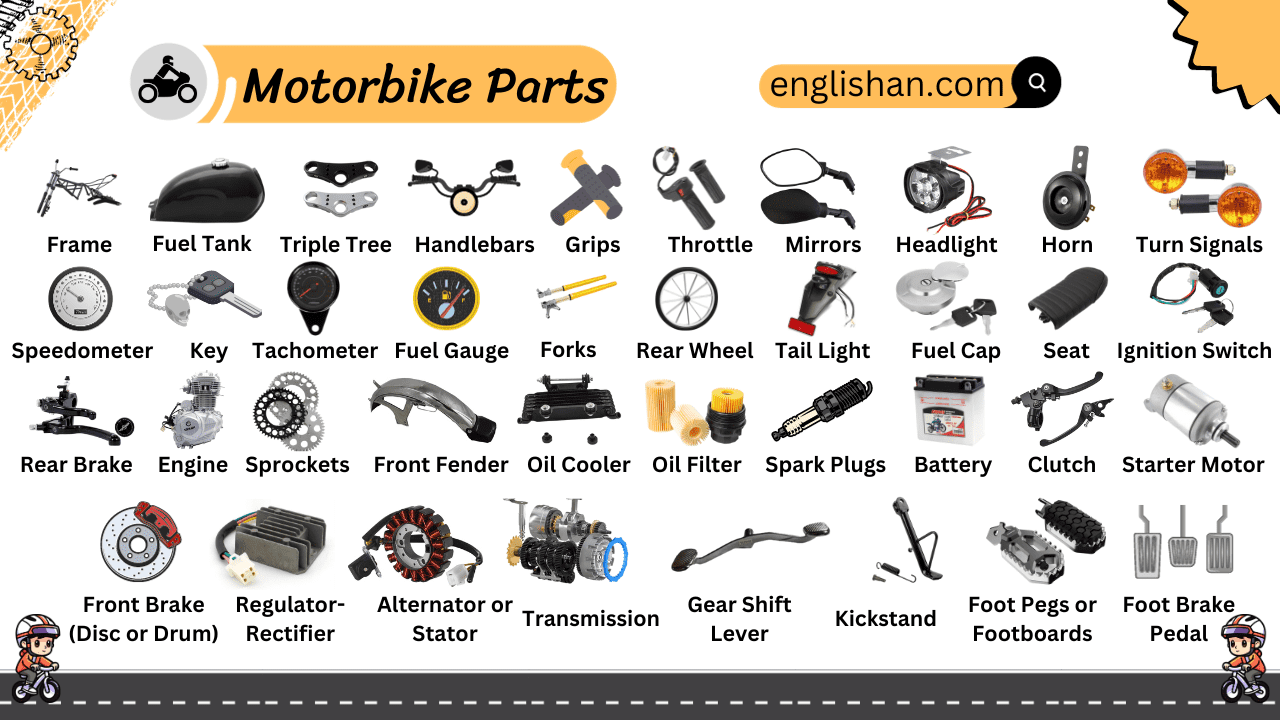Surprising Facts About Maintaining Bike Parts Wellington in Humid Climates
Surprising Facts About Maintaining Bike Parts Wellington in Humid Climates
Blog Article
Discover the Necessary MotorBike Parts You Need for Optimum Efficiency
Understanding the important parts of a motorcycle is essential for achieving peak efficiency. Each part, from the engine to the braking system, plays a crucial duty in overall functionality and safety. Routine maintenance can avoid unforeseen failures and enhance the riding experience. Many cyclists forget the details of these systems. Uncovering exactly how they function together can result in a much more efficient ride. What important components should every rider prioritize?
The Engine: The Heart of Your Motorcycle
The engine acts as the core part of a bike, driving its efficiency and defining its capabilities. It is accountable for converting fuel right into power, which powers the bike forward. Different kinds of engines are utilized, consisting of single-cylinder, V-twin, and inline setups, each offering unique attributes fit for different riding functions and designs. The engine size, commonly measured in cubic centimeters (cc), significantly influences efficiency, with bigger engines generally providing more power and torque.Furthermore, the engine's design and modern technology, such as gas injection systems or air-cooling versus liquid-cooling, affect efficiency and dependability. Maintenance is important for peak operation; variables like routine oil changes and checking ignition system warranty long life. Motorcyclists usually consider an engine's responsiveness and smoothness, as these attributes boost the general riding experience. Ultimately, the engine continues to be an important element that defines not just the bike's efficiency however also the biker's link to the machine.
The Transmission: Changing Gears Efficiently
The transmission plays a necessary function in a motorcycle's efficiency, especially in the mechanics of gear moving. Understanding how to change gears smoothly can enhance the overall riding experience, while normal upkeep guarantees peak performance. Correct focus to these aspects can greatly impact the durability and efficiency of the motorcycle.

Equipment Shifting Mechanics
Smooth equipment shifting is essential for optimal motorbike efficiency, significantly impacting both acceleration and control. The auto mechanics of gear shifting include the interaction in between the clutch, equipment bar, and transmission system. When a cyclist involves the clutch, it disengages the engine from the transmission, enabling a gear change without damaging the parts. A well-timed launch of the clutch, integrated with specific motion of the equipment bar, facilitates a smooth adjustment between gears. This process ensures that the engine operates within its finest power band, boosting performance. Motorcycle Parts Auckland. In addition, recognizing the equipment proportions and their impact on speed and torque can assist riders make informed choices during shifts, inevitably adding to a much more responsive and enjoyable riding experience
Upkeep Tips Value
Regular maintenance plays a vital role in ensuring that the transmission system runs efficiently, allowing for smooth gear shifts. Regularly inspecting and changing the transmission liquid is crucial, as old liquid can result in raised friction and wear. In addition, inspecting the clutch for wear assurances peak engagement and disengagement, protecting against slippage during gear adjustments. Lubrication of moving components is equally vital to lower rubbing and enhance efficiency. Bike owners need to additionally monitor for leaks and uncommon sounds, as these can show underlying problems. By adhering to these maintenance pointers, riders can extend the life-span of their transmission system, assuring that gear changes stay smooth and adding to the overall performance of their motorbike.
The Braking System: Ensuring Safety on Every Adventure
Braking systems are basic components that directly influence a motorbike's security and performance. They contain various components, consisting of brake pads, blades, calipers, and hydraulic lines, all working together to guarantee reliable deceleration. The kind of braking system-- generally either disc or drum-- affects responsiveness and quiting power.Regular upkeep is vital to support peak performance; used brake pads can cause lowered efficiency and boosted quiting distances. Additionally, the top quality of brake liquid must be monitored, as it can absorb dampness with time, endangering braking efficiency.Riders need to likewise consider the relevance of anti-lock stopping systems (ABS), which stop wheel lockup during abrupt quits, enhancing general safety and security. Appropriately working brakes are not nearly quiting; they impart self-confidence in the biker, permitting more secure navigating with different terrains. Inevitably, a dependable stopping system is crucial for delighting in every trip with comfort.
The Suspension: Enhancing Comfort and Control
A well-functioning shock absorber significantly adds to a motorbike's total performance, complementing the effectiveness of the braking system. The suspension plays a substantial function in soaking up shocks from uneven surface areas, assuring a smoother trip while keeping tire contact with the road. This get in touch with is necessary for both stability and control, allowing motorcyclists to navigate corners with self-confidence and precision.Different kinds of suspension systems, such as telescopic forks or mono-shocks, offer differing degrees of comfort and handling. Appropriately tuned suspension boosts responsiveness, providing the biker with an extra linked feel to the motorbike. Routine upkeep checks are very important to determine the suspension parts, consisting of dampers and springs, are working at their finest. An efficient shock absorber not only elevates the riding experience but likewise adds to the longevity of other motorbike components by minimizing deterioration. Because of this, investing in top quality suspension is important for any severe motorbike enthusiast.
The Tires: Attaching You to the Roadway
Tires play a crucial function in a motorbike's efficiency, functioning as the key link in between the motorcyclist and the roadway. Understanding the different types of tires available can considerably influence taking care of and security. In addition, normal upkeep is important to assure peak tire performance and long life.
Tire Enters Explained
How do different tire kinds affect a motorcycle's efficiency? Tire types play an essential duty in figuring out a motorbike's grip, stability, and handling. Sporting activity tires, designed for high performance, deal boosted grip and responsiveness on smooth roads, making them perfect for racing and aggressive riding. On the other hand, exploring tires prioritize resilience and convenience, giving a smoother ride for long-distance travel. Off-road tires, characterized by their tough step patterns, succeed in traction on unpaved surface areas, suitable for adventure lovers. Furthermore, dual-sport tires blend characteristics from both off-road and on-road groups, accommodating flexible riding requirements. Inevitably, picking the best tire type is necessary for optimizing performance, making sure security, and improving the general riding experience.
Upkeep Tips Offered
While riding when traveling, maintaining ideal tire problem is important for safety and security and efficiency. Frequently inspecting tire stress is essential, as under-inflated tires can lead to poor handling and enhanced wear. It is recommended to examine step depth regularly; used tires concession grip and stability. In addition, cyclists must search for indications of damage, such as bulges or splits, which can suggest the demand for replacement. Revolving tires occasionally guarantees even put on, boosting longevity. Keeping tires clean from particles and preventing excessive visuals can prolong their lifespan. Finally, keeping appropriate positioning and equilibrium adds to peak efficiency, minimizing stress on various other bike components. Complying with these maintenance pointers will significantly boost the general riding experience.
The Fuel System: Sustaining Efficiency and Effectiveness
The fuel system plays an essential duty in optimizing a motorcycle's efficiency and performance, as it ensures the ideal delivery of gas to the engine. It consists of a number of important components, including the gas container, gas pump, fuel filter, and fuel injectors or carburetor. Each part has to operate successfully to guarantee a smooth and effective ride.The fuel tank shops gasoline and provides it to the engine using the fuel pump, which produces the required stress. A gas filter prevents contaminants from entering the engine, while the injectors or carburetor mix fuel with air for combustion.Proper upkeep of the gas system is crucial; a stopped up filter or malfunctioning injector can bring about reduced efficiency and boosted fuel consumption. By verifying that the fuel system runs successfully, bikers can enjoy better throttle feedback, better fuel economic climate, and overall enhanced riding experience.
The Electric System: Powering Your Adventure
An effective electrical system is vital for the overall performance and safety and security of a motorcycle, as it powers vital elements such as the ignition, lights, and numerous electronic systems. This system includes the battery, which shops power, and the alternator, in charge of creating power while the engine runs. The wiring harness attaches these components, guaranteeing trusted power distribution.Additionally, fuses secure the system from overloads, while relays aid control high-current tools with low-power signals. A well-maintained electric news system boosts efficiency by guaranteeing smooth starts and regular procedure of signals and lights, vital for cyclist presence and safety.Regular checks of the battery's charge and connections are essential for stopping electrical failings. Bikers should also inspect circuitry for damage, making sure all components work ideally. Inevitably, a robust electric system adds substantially to the general performance and dependability of the motorcycle.
Often Asked Inquiries
How Typically Should I Replace My Motorcycle's Battery?
The frequency of bike battery substitute depends upon use and maintenance (Bike Parts Wellington). Typically, batteries should be changed every 3 to 5 years. Regular checks can aid identify when a substitute is required for peak performance
What Devices Do I Required for Standard Bike Upkeep?
For basic motorbike maintenance, one requires vital tools such as a socket collection, wrenches, screwdrivers, pliers, tire pressure scale, and a torque wrench. These tools help with effective maintenance and assure the bike runs effectively and safely.
How Can I Enhance My Motorcycle's Aerodynamics?
To boost bike the rules of aerodynamics, one ought to consider adjusting fairings, utilizing windscreen expansions, enhancing body setting, and lowering general weight. These alterations assist minimize drag, boosting stability and fuel effectiveness during rides.
What Are the Indications of a Failing Electrical System?
Signs of a failing electrical system include lowering lights, difficulty beginning, uneven tool analyses, and blown merges. Bike Parts Wellington. Unusual smells or corrosion around battery terminals may additionally show underlying issues needing prompt interest for security and performance

Just how Do I Select the Right Oil for My Motorcycle?
When choosing oil for a motorcycle, one need to think about the manufacturer's specifications, viscosity scores, and the type of riding. In addition, synthetic versus traditional oil can impact performance and engine security, influencing the choice substantially. The engine dimension, generally determined in cubic centimeters (cc), considerably affects efficiency, with bigger engines normally offering even more power and torque.Furthermore, the engine's design and technology, such as gas injection systems or air-cooling versus liquid-cooling, influence performance and integrity. A well-functioning suspension system greatly adds to a motorcycle's general efficiency, enhancing the effectiveness of the braking system. The fuel system plays a vital duty in making the most of a motorcycle's performance visit this site and effectiveness, as it ensures the ideal distribution of fuel to the engine. A gas filter prevents pollutants from entering the engine, while the injectors or carburetor mix gas with air for combustion.Proper maintenance of the gas system is essential; a clogged up filter or malfunctioning injector can lead to lowered performance and enhanced gas usage. A well-kept electrical system enhances efficiency by ensuring smooth beginnings and regular procedure of lights and signals, vital click for info for motorcyclist presence and safety.Regular checks of the battery's fee and connections are vital for preventing electric failings.
Report this page